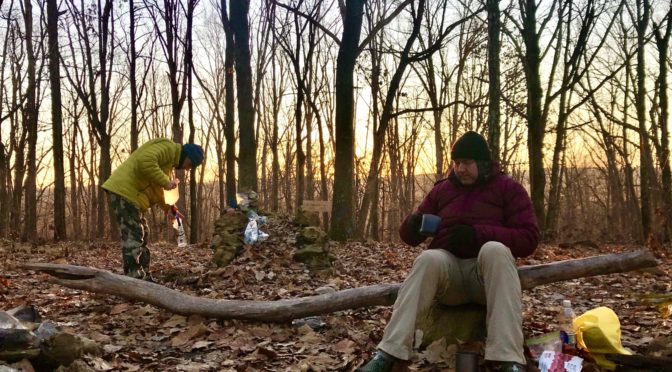Editor’s note: Next week we unveil our first half GetBackpacking! plans for 2022. This week, for the yet-to-be-convinced of the joys of backcountry adventure, we look at the “why” — Why we do this?
Some folks, even avid hikers, have a knee-jerk reaction to backpacking. To the perceived discomfort, the perceived inconvenience, the perceived difficulty. Backpacking’s sometimes negative image is, in our opinion, a perception problem.
To put backcountry adventure in the proper perspective (meaning “our” perspective) we revisit a piece from 2019 that describes a trip some would, based on the start, view as a nightmare of a weekend. Or at lease a weekend filled with discomfort, inconvenience, difficulty. Stick with it though, and we think your perception might change. Or at least the way you view your fellow backpackers.
* * *
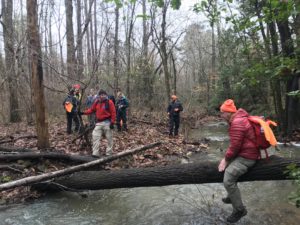
We hiked in three miles in the cold (about 40 degrees), the rain (roughly two inches would fall over a 36-hour period), the dark. The one consolation? The frozen rain that was forecast failed to materialize.
In the end, our trip to the Birkhead Mountain Wilderness was the best trip in a year full of pretty great trips.
Why? Because backpackers are a little different. They start out as regular day hikers. Short, hour-long hikes at first. Then half days that become full days. Then one day the sun is setting and they aren’t ready to leave the trail. So they take the next logical step and make it so they don’t have to. They become backpackers.
If you haven’t made it to backpacking yet, you may be wondering how cold and rain and dark translate to a great weekend. Here’s how:
The forecast
Backpack enough and you learn to take the forecast into consideration, but you don’t take it as gospel. The forecast for our trip started out with a good chance of freezing rain. Then the rain window became a moving target: maybe it would begin Thursday and end Friday night, maybe it would begin in the wee hours of Friday and run through mid afternoon Saturday. Rain looked like a given, cold likewise. Consider those two factors as givens and it shouldn’t matter when they might occur.
Get a plan
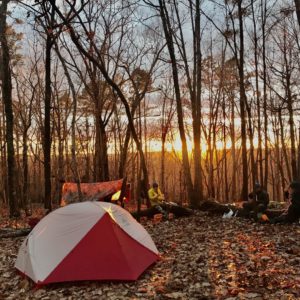
Set up dry and you should stay dry. Since it looked like rain was a good possibility upon arriving at our campsite, we took an extra tarp, an 18’ x 18’ piece of super light polycro — that two of us could take turns holding while a third camper pitched his tent underneath. The weight and space investment was minimal in light of the benefit of setting up dry. A good bet, it turned out, since it was indeed raining when we set up camp Friday night around 8:30.
The plan also included making sure everyone came equipped with rain gear, either an adequate poncho or rain jacket and pants. It was a little over 3 miles to camp, about an hour and fifteen minutes of hiking in, yes, a steady rain. Again, good planning, a good investment of weight, that polycro.
The likelihood of rain also meant bringing extra clothes. Rain gear may keep out the rain, but even when the temperature’s a nippy 40, wearing it and hiking in full pack will build up some heat making sweating is inevitable, even with the best rain gear. Layers that get even a little moist stay that way unless the weather turns dry and sunny.
Always look on the bright side of life
Another consequence of hiking in the rain: crossing rain-swollen creeks.
In our case, the forecast did suggest the rain would end, anywhere from mid-morning Saturday to late in the day. Cloudless skies were forecast for Sunday. It was a forecast that made any inconvenience, any discomfort on the front end worth the trip if there was a chance of hiking a stark, winter forest under a bright sun.
Saturday, we set out about 9:30 a.m. for a 10-mile day-hike in the Birkheads. It was moody when we hit the trail, but not raining. We had a very light spritz around lunch. Around 3, the sun made its first appearance, breaking out for good around sunset.
Saturday sunset
Here’s where putting up with a rain early on started to pay off. As we were sitting around the fire having dinner, Aaron stopped. “Look at the sunset!” We all stopped and looked west and south, where the late-day sun was peeking over a lingering bank of low-level clouds. We readjusted to take in the sunset, which lingered for a good hour, switching from yellow to pink to orange to crimson to deep crimson. Our camp was atop one of the wilderness area’s rounded peaks: devoid of its canopy, we had a good view of the glowing Uwharrie Mountains to the south and west. Sunset held our attention until it was dark, the fire and its warmth for about an hour after that. When our supply of both was exhausted and we started to feel the temperature plunge into the 30s, we retired for the night.
Sunday sunrise breakfast
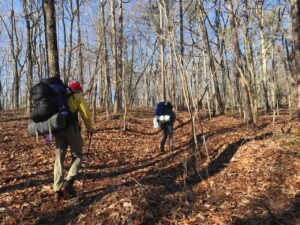
As promised, the day dawned with nary a cloud. We packed up, hiked out, then drove about 20 minutes to a trail leading less than a mile to the lone unobstructed view on the Uwharrie Trail, atop 922-foot Little Long Mountain.
Almost everyone loves a view. Not everyone is willing to work for it. When you do, though, it’s all-the-more special. It wasn’t the eight-tenths-of-a-mile hike up to Little Long Mountain that made the view so stellar. If that were all it took, the view would have simply been “nice.” But for us, the view was a full-circle, 180-degree, zero-to-60 special viewing. We’d begun the weekend in a drenching rain, set up camp wet, spent Saturday hiking under a threatening sky. Saturday evening’s sunset marked the turning point, the start of being well-rewarded for our patience and perseverance. The forecast had promised a carrot and we were gnawing at it like Bugs Bunny. It got better with Sunday’s magnificent sunrise, with the dry hike out from camp, with the summit of Little Long Mountain.
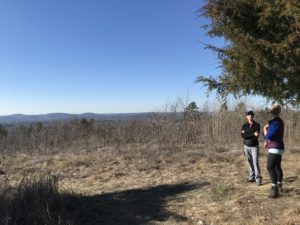
To us, standing atop Little Long, taking in the sweeping view, soaking up the warming sun, basking in the quiet, the experience wasn’t just nice.
It was why we do this.
* * *
Intro to Backpacking
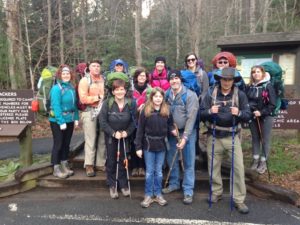
While we won’t announce our full first-half 2022 lineup until next week, we are announcing that registration is open for our first GetBackpacking! Intro to Backpacking class of the year. This three-part class includes a 1.5-hour Gear session via Zoom on Wednesday, Feb. 23; a 5-hour in-field training session at Morrow Mountain State Park on Saturday, March 5; and a weekend graduation trip to South Mountains State Park March 18-20. Some loaner gear is available. For a full rundown of the course and to register, go here.
